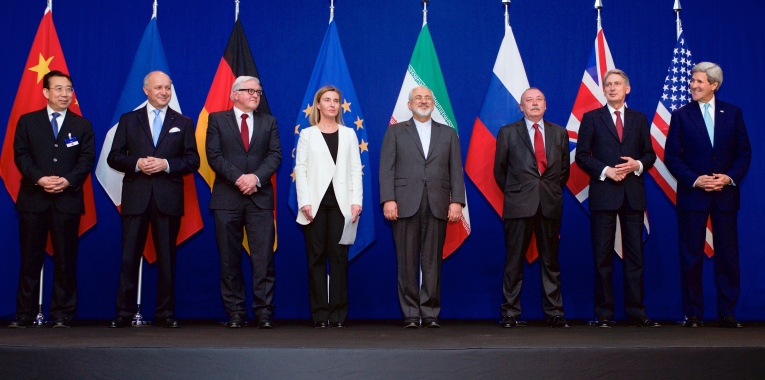Despite signing and ratifying the Treaty on the Non-Proliferation of Nuclear Weapons (NPT) in the late 1960s and early 1970s, Iran was considered a security threat by the international sphere due to suspicion about its development of nuclear weapons. The NPT signatory countries are not willing to allow Iran to develop nuclear weapons due to, primarily, two main reasons. Iran’s close ties with non-state actors Hamas and Hezbollah undermine its international legitimacy. Furthermore, its heated rivalry with regional neighbours Israel and Saudi Arabia and neighbouring threats such as those posed by Afghanistan’s drug trade, the Islamic State (ISIS or ISIL), or Iraq’s instability could drive Iran to use nuclear weapons against them if it had them, or so the international community believes.
However, there is no clear explanation as to what would happen if Iran acquired nuclear weapons. Nuclear alarmists, experts who believe nuclear proliferation is a security threat, believe that if Iran were to acquire nuclear weapons, a nuclear chain reaction would succeed, so Egypt, Saudi Arabia, or Turkey would follow Iran’s steps. In a similar way, they argue that Iran’s access to nuclear weapons would be yet another factor to a global “tipping point” in which nuclear proliferation would spread so quickly that almost any country would acquire them. Moreover, nuclear alarmists deem the second nuclear age (considered to have begun in 1991) to be less predictable, more complex, and therefore more dangerous than the Cold War due to the existing horizontal nuclear proliferation.
On the other hand, others agree that a nuclear Iran would not pose as terrible a threat as some consider. In this sense, Gavin contends that the threat Iran poses as a rogue state was already experienced in the Cold War with the Soviet Union and the People’s Republic of China. Indeed, he believes that an Iran with nuclear weapons would gain international legitimacy and security, thus making it less aggressive than it has been by forcing it to act with great restraint. It is unlikely that Iran would transfer its nuclear stockpile to Hamas or Hezbollah for it would be too scarce and, therefore, too precious to give away so easily.
The nuclear deal between Iran and the P5+1 (United States, United Kingdom, France, Russia, China, and Germany), which was accepted on 16th of January 2016, seems to be a solution to the question. The agreement seeks to limit and control Iran’s nuclear activities, as well as ensuring that no nuclear weapon is developed for any of the aforementioned possible ends. In consequence the United Nations (UN) sanctions on Iran to stop its uranium enrichment and conversion activities are to be lifted. Hence, the deal is supposed to be a stabilising factor to Middle East turmoil for at least its timespan (15 years).
This brings us to the question: is the nuclear deal definite, that is, will the nuclear deal permanently stop Iran from obtaining nuclear weapons? Views differ on the effectiveness of the deal. The Gulf Cooperation Council (GCC) composed of Bahrain, Kuwait, Oman, Qatar, Saudi Arabia, and the United Arab Emirates, while supporting the deal, reflects concern over the lifting of the UN sanctions in the belief that these will allow Iran to expand Shiite influence in the region at the expense of Sunnis. Israel is also concerned over an Iran with no sanctions to limit its foreign policy. As Israeli Prime Minister Binyamin Netanyahu stated, Israel would increase its defence and warned against violation of the agreement.
Previous US secretaries of state Henry Kissinger and George P. Schultz are open to the possibility of a future nuclear Iran given that the deal only temporarily restricts Iran’s facilities and material but does not give them up. They further argue that violating the agreement will be easy and difficult for the international sphere to detect. US allies in the region might conclude that the US has switched nuclear cooperation for the acceptance of Iranian hegemony. Moreover, they believe that the Middle East will not stabilise itself since Sunni states will resist Shiite dominance in the region.
Hence, it is clear that the Iranian nuclear deal should not be regarded as final or ultimate. It is a mere phase during which long-lasting solutions to the question should be found. It is now up to the P5+1 to lead talks with Iran and other key regional actors to find the best solution to stabilise the Middle East in nuclear terms and settle any possible security threats among the states.
A possible future nuclear Iran does not represent a threat to the international society, but it would to regional neighbours such as Israel and Saudi Arabia. Iran’s primary aims in acquiring nuclear weapons are international legitimacy by which it would be able to increase trade relations with the West and Asian countries and security from bordering states and non-state actors that could bring instability to its territory. It would be very unlikely that Iran would supply such weapons to Hamas or Hezbollah for their destructive power, their value, and the possible destruction of the Iranian state are too much of a risk. However, assuming Iran’s rational use of nuclear weapons is a grave mistake, for one cannot completely assume any state to be absolutely rational. Thus, though a nuclear Iran may not pose a serious threat, the international community should be always be wary and prepared to take action in case its activities endanger Middle East security.
In regards to the threat a nuclear Iran represents to key regional actors, the International Atomic Energy Agency (IAEA) responsible for the peaceful use of nuclear technology should implement a strong binding agreement for the transparency of nuclear activities in the Middle East by which all regional actors should adhere to without exception. Such transparency would allow any regional state to know whether one is developing or is very close to developing nuclear weapons. Information would promote peace among such nations, though for such information to be reliable and valuable, strict measures should be applied to avoid corruption or covert activities leading to misinformation. These measures should not gravely restrict a country’s sovereignty, but should indeed carry out their purpose effectively.
Perhaps effective cooperation and honesty, as well as preparation for the worst scenario, may be a further step in the path to Middle East peace and stability.
Mireia Raga Gómez

